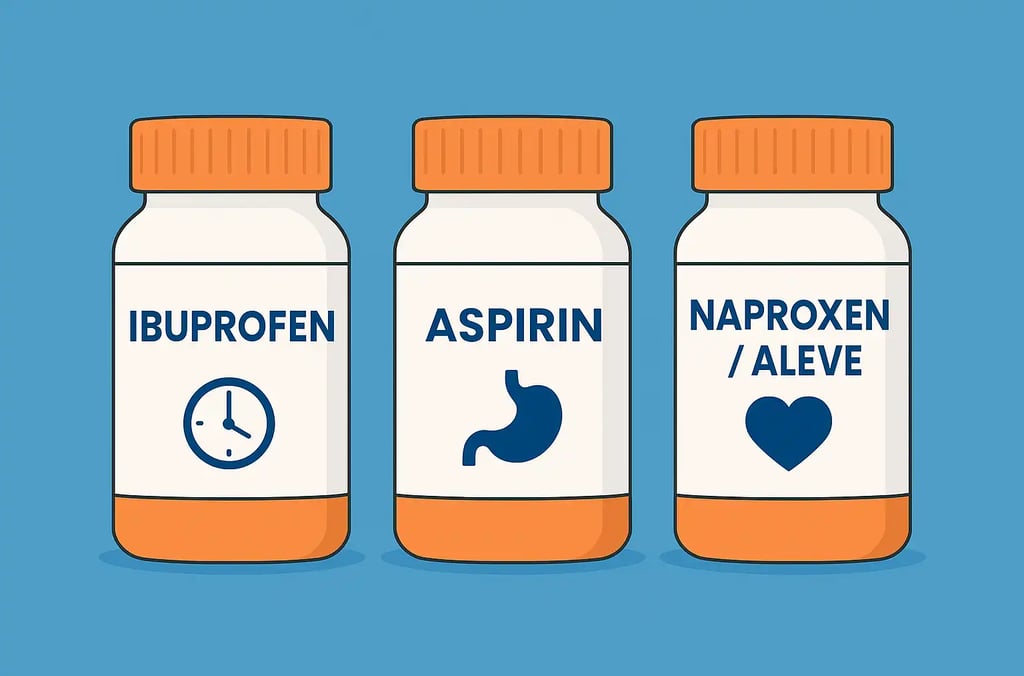Ibuprofen vs Aspirin, Naproxen, and Aleve: A Clear Comparison of Common NSAIDs
Compare ibuprofen, aspirin, naproxen, and Aleve in this detailed NSAID guide. Learn differences in side effects, safety, and usage to choose the right pain reliever.


Ibuprofen vs Aspirin, Naproxen, and Aleve: A Clear Comparison of Common NSAIDs
Ibuprofen, aspirin, and naproxen (aka Aleve) are all nonsteroidal anti-inflammatory drugs (NSAIDs), but they differ in how long they last, how they’re used, and how they affect your body. Choosing the right one depends on your symptoms, health history, and how often you need relief.
Ibuprofen is typically used for short-term relief of pain, fever, and inflammation. It’s fast-acting and may be taken every 4 to 6 hours.
Naproxen, including the brand Aleve, lasts longer in the body — it's usually taken every 8 to 12 hours — making it helpful for longer-lasting relief.
Aspirin, while also an NSAID, is now more commonly used for heart protection in low doses rather than for pain relief, due to its higher risk of stomach side effects.
All of these medications carry some risk of stomach irritation, kidney effects, or bleeding, especially with long-term use or in older adults. Talk to your healthcare provider about which option is safest for you, especially if you take other medications or have ongoing health conditions.
FAQ
Which is better for inflammation: ibuprofen or naproxen?
Both are effective anti-inflammatories. Naproxen lasts longer, so it's often used for more chronic conditions, while ibuprofen is more commonly used for short-term flare-ups or injury-related pain.
Can I alternate or combine these medications?
You should not alternate or combine NSAIDs like ibuprofen, aspirin, and naproxen unless instructed by a healthcare provider. Doing so can increase the risk of stomach ulcers, bleeding, or kidney damage.
Is Aleve different from naproxen?
Aleve is a brand name for naproxen sodium. It contains the same active ingredient as generic naproxen but may be dosed slightly differently.
Why is aspirin used for heart health?
Low-dose aspirin helps thin the blood to prevent heart attacks and strokes. This is a different use than for pain relief and should only be done under medical guidance.
Which is easiest on the stomach?
It depends on your individual health. Ibuprofen is often easier on the stomach than aspirin but still carries risks. Naproxen may be a middle ground, but none should be taken long-term without medical advice.
Do I take them with or without food?
Ibuprofen: It’s best to take ibuprofen with food or milk. This helps reduce the risk of stomach irritation, especially if you're taking it for several days.
Aspirin: Aspirin should also be taken with food or with a full glass of water. It’s known to irritate the stomach lining, so taking it with a meal helps protect against that.
Naproxen (Aleve): Naproxen should be taken with food, milk, or an antacid to help prevent stomach upset. Like other NSAIDs, it can cause gastrointestinal side effects if taken on an empty stomach.
Disclaimer
This page summarizes information from trusted medical sources and is provided for general knowledge only. lt is not medical advice; Always consult your doctor or pharmacist for personal medical guidance (For a more comprehensive explanation please see the full disclaimer).
Resources
The information above has been gathered from several reputable sources, including the following:
[1] Mayo Clinic – Ibuprofen
[2] Mayo Clinic – Aspirin
[3] Mayo Clinic – Naproxen


